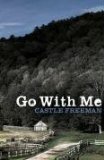| Castle Freeman |
 |
| What inspired you to write GO WITH ME? |
| On the genesis of GO WITH ME: I have always loved the old King Arthur tale of Sir Gareth, the unpromising scullion at Camelot who overcomes odds (and the contempt of the maiden he is trying to aid) to prevail over an escalating series of bad guys. For years I had wanted to transpose that general idea into a modern tale set in this out-of-the-way part of the world; but then when I did it, the results were disappointing. The story, as written straight out, seemed pretty thin. Therefore I added the alternating chapters involving the band of semi-sober guys sitting around the old sawmill digressively commenting on the main story and much else. They made all the difference, for me. They added color, history, feeling, and especially humor. Therefore, if inspiration was involved, it entered not at the outset but later, in the need to bring the story to a different level. |
| I'm glad to see chivalry is alive and well in Vermont! One of the strengths of the novel is its sense of place and I guess it's set near where you live. I was in Vermont in September not far from you, I think, in Manchester. I was very taken with the area but the only mill I saw had been turned into an upmarket glass and ceramics outlet. Though in the Green Mountains you get more of a sense of maybe how it used to be. Whizzer and his cronies bemoan the changing landscape and I wonder how you feel about it? |
| I guess how I feel about it is ambivalent. On one side, the more people move here, the more the land becomes built up and the less available and beautiful it is; and as is true everywhere else, the more convenient life becomes, the more complex it is and the fewer simple consolations it offers. On the other side, convenience isn't bad, and in my case, having come here from away, I am part of the change; I can't deplore it too much and be honest. Besides, it seems to me Whizzer and his friends, though they bemoan the changes they have seen, are resigned to them and try to make light of them (see Chapter 10). They aren't--and I hope not to be--mere cranks endlessly complaining about the loss of The Way Things Were, a particularly vain and tiresome standpoint. Manchester is about 35 miles from here. I used to work there years ago. It's very different from this area: more people, more commerce, much more money. |
| Actually, I think your ambivalence comes across. A friend lent us their little house in the woods and for us, from the south of England, it seemed wonderfully remote and romantic (but it was good to have a great book shop and a decent cup of coffee just around the corner). I really enjoyed the old boys at the sawmill - some bits made me laugh out loud. Do you know those characters? |
| Not really. Certainly none corresponds to or closely resembles any real person. I made them up. Of course, nothing comes from nothing; some of those fellows are a little like me, I guess, in particular Whizzer, but all are 95% fiction. Their milieu isn't entirely unlike mine, but it's more unlike than like. You're right about the Northshire Bookstore (I guess that's the one in Manchester you refer to). It is the best bookstore in New England, at least rural N.E. |
| The plot is so simple and the story so self-contained that I felt it could be seen as having an ulterior meaning. In a sense, without wanting to push things too far, it could be read as an allegory about upholding American values against the lawless forces of international terrorism. This thought was reinforced by certain post-9/11 references including Lester's thought that any 'Islamer or anybody else who got in front of Walt's goose gun was going to be out of the fight for good.' Was this intentional? |
| You are one of the very few readers who has even noticed (or anyway who has commented on) the references to the 2001 attacks on New York. Certainly I did not intend an allegory. I put the references in to set the story in a vaguely present time, and because they seemed apt in their context. That said, one of the things the story is about is how a certain kind of fairly isolated, fairly traditional American community can use means outside the law to defend itself and its values against threat. It's also true that the way this is dramatized is exaggerated and made metaphorical. But I didn't have the current terrorist threat we all must now live with specifically in mind. In the book I wrote after this one, titled ALL THAT I HAVE and to be published there by Duckworth in (I think) January, this same topic of legal and extra- or supra-legal ways in which the community protects itself, is more to the fore and is treated in much more detail. I guess we can infer that this is something that interests me, though I didn't know it at the time. |
| I must admit, I'm glad it wasn't your intention. As one of the millions who marched in London against British involvement in the 'war on terror', I would feel uncomfortable enjoying a book that was in any way a glorification of that conflict. However, one of the interesting aspects of your novel is that our sympathies are so aligned with the avenging trio, that a violence-averse reader can be relieved, even pleased, when someone gets their head blown off! It does raise the question of what can be done when the forces of law and order are unwilling or unable to protect their community. It' a very interesting area and I look forward to reading your next book. |
| On the violence in GO WITH ME, I didn't mean it to be taken at face value. It's exaggerated, almost cartoon violence, precisely in the spirit of the old Malory tale, in which the battles of the knights are similarly gory, extreme, and finally quite incredible. I was aiming for a like effect, and it has kind of puzzled me that many readers have been willing to take the book as a thriller. |
| Which writers do you like to read? |
| I guess I like what everybody else likes: among the American classics, William Faulkner and particularly Mark Twain; in UK, especially Joyce. Among recent authors I am not that well read, but I have greatly admired the late George V. Higgins, and more recently Cormac McCarthy, Richard Price, Alice Munro (Canadian), and Marilynne Robinson, whom I see you have interviewed in the past. |
| Castle Freeman |



